- Home
- Marsha Canham
Swept Away Page 4
Swept Away Read online
Page 4
His modesty thus restored, she frowned and took a step closer to the table. “All that hair,” she said, giving her cane another impatient wave.
Broom nodded again and used the edge of one ham-like hand to scrape the wet black waves off the man’s face.
Florence stared, and it took another full minute for the smile to fade off her lips. “Good and gracious God,” she whispered.
“Do you know him?” Annaleah asked.
A spotted hand, all knuckles and glittering rings, rose to clutch her throat as Florence bent over the body. “I pray God I am wrong, but...I believe it is the vicar’s brother: Emory Althorpe.”
“A gentleman?”
Florence straightened. “Oh, hardly that, my dear. He is a scoundrel, a rogue, an adventurer. And if I am not mistaken, the last I heard, he was wanted by the crown for treason.”
“Treason!”
“Indeed. By all accounts, his last great adventure was to help Napoleon Bonaparte escape from Elba.”
CHAPTER 3
A note was dispatched in short order to the vicarage, summoning the Reverend Mr. Stanley Althorpe to Widdicombe House at his earliest convenience. There was some discussion about sending for a doctor as well, but because Willerkins had learned a considerable amount about physicking in the army and had even operated on a horse the previous summer, Florence decided it might be more prudent to let him treat Emory Althorpe until his brother arrived and assumed responsibility. In the meantime, the patient was transferred to an upper bedchamber, where charity dictated that he be washed free of sand and salt water, and the more serious abrasions be treated with liniment and bandaged.
It was during this washing stage that Willerkins made a somewhat disturbing discovery. The marks on his back and limbs that Annaleah had assumed had come from being scraped to and fro in the surf, were in fact older wounds that had been inflicted by a knife or some other man-made instrument. They were precise enough in length and depth for Willerkins to further surmised that Althorpe had been subjected to a particularly insidious form of torture as recently as two, perhaps three weeks earlier to judge by the state of healing that had occurred.
Unsettled by this new information, Anna and her aunt retreated to the day parlor to await the arrival of the vicar. Undeniably more exciting than watching mortar crumble out of the bricks, Annaleah kept one ear tuned to the hallway while her imagination formulated all manner of possible intrigues. A man wanted for treason and sedition had been tortured--by whom, and for what reason? How had he ended up in the cove unconscious and unclothed? She had never been this close to a genuine criminal before and had no idea how one might react upon wakening. Her aunt had ordered Broom to remain in the room as a precaution, but--to put it kindly--Broom was only slightly less fearsome than an angry puppy. A loud shout would send him cowering into the corner. Upon discovering this, Althorpe could easily overpower him. Then, if he was desperate and cold blooded enough, proceed to kill them all to avoid being handed over to the authorities.
“Are you overly warm, dear?”
Anna started and glanced across at her aunt. “What?”
“You seem a little flushed. Perhaps you are sitting too near the fire?”
“I am... a bit warm,” she agreed in a broken whisper. “How long does it take to get to the vicarage and back?”
“The way Throckmorton drives? Half the afternoon, I expect.”
Anna stood and paced to the open door. “Are you not worried? Having him in the house, I mean? Is it not...dangerous? Might he not resent waking and finding Broom standing guard on his door?”
“I expect he will resent it a good deal less than finding himself in a gaol cell. And if you are asking if I am afraid Emory Althorpe is going to perpetrate some act of violence upon us, my answer is gracious me, no. Despite all the wicked stories that have arisen about him over the past few years, I was always rather fond of him. As a boy, he used to ride out here from his family estates at Windsea Hall and help Willerkins exercise the horses--we used to have a quite a fine stable until the army interfered. After most of our stock was commandeered, young Rory continued to visit, although I always suspected it was as much to remove himself from his father’s company as to seek mine, and with good reason I dare say. The Earl of Hatherleigh was such a dreadful man. Cruel and brutish.” Her voice hardened a moment with the memories. “He believed in using harsh measures to discipline his four sons, even when they were just babes in arms. In fact, I suspect it was because Edgar Althorpe continuously smacked Poor Arthur on his head that the boy was never quite right in later years.
"Suffice it to say Emory escaped Windsea at any opportunity or excuse. He would bring me books and read them aloud and we would have jolly long discussions about the author’s intentions, or the story’s purpose. And he was such a handsome boy. Handsome as the devil. Some might say he was a little too wild for their liking, but I have always envied a little wildness in a man. Nothing worse, you ask me, than a primping, preening fop who capers about in a froth of lace, moaning that his cravat is lacking starch or his newspapers are not ironed perfectly flat.”
Anna hid a faint smile as she recognized traits her father and brother shared along with half the men in England.
“On the other hand,” Florence gave the leg of the nearby table a little rap with her cane, “every now and then a storm blows in off the sea and the only man left standing on the cliffs is the one who defies the elements, who chooses to live by his own rules and scoffs at anyone or anything that would dare set boundaries. Emory was like that, deliberately resisting all attempts to fit him into a mold. Even when he knew there was a savage beating waiting for him when he went home, he would sooner sit on the docks and listen to the old salts tell of their adventures in foreign ports than learn how to write the alphabet in Greek. It came as no surprise, to me anyway, when he ran away to sea one day. He told me he wanted to see what lay beyond the other side of the horizon; he wanted to visit the bazaars in Madagascar, and search for gold in Hispaniola. He wanted to hunt elephant in Africa and he promised to carve me a new walking stick out of ivory. He wanted....” Florence’s gaze, having drifted out of focus, snapped clear as she looked at her niece. “Well, he wanted a lot of things, most of all adventure. Apparently he found it.”
“You said he is accused of helping Napoleon Bonaparte escape Elba?”
Florence nodded. “Not a fortnight ago some wretched man came to Brixham--Ramsey, I believe his name was, claiming to have proof Emory Althorpe was paid a great deal of money to sail to Elba and whisk the little beast out from under the noses of his English guards.”
“You do not believe it?”
“Oh, I absolutely believe he would be quite capable of doing such a thing. But it would be for the adventure, you know, not for money--which he always held in such admirable disdain. Nor would it be out of any misguided regard for the Corsican. In fact, he held a commission in the British navy several years back. He fought as a young lieutenant in Admiral Nelson’s fleet. But that was, oh, ten years ago. Since then there have been rumours of him throwing in with pirates, of him fetching up his own ship and running the blockades around France and Spain. I do know for a fact the vicar has been trying in vain for the last year or more to contact him and bring him home.”
“Surely not to stand trial?”
Florence shook her head. “Family business, I believe. Emory was the third son, you see, and having no prospects of inheriting more than an annual pension some day he never really concerned himself with the daily affairs of the estate. All of that was conferred upon the oldest boy, William, who was groomed as a matter of course to become the Earl of Hatherleigh when their father passed away. Next in line after William was Poor Arthur--and we always called him Poor Arthur, even when he was a boy--but as I said, he turned out to be...mmm...not perfectly right in the head,” she whispered, tapping her forefinger on her temple. “He insisted from an early age that his arms were wings and his fingers were feathers. He actually ruffles the
m when he talks, and makes these rather peculiar clucking sounds in his throat when he is agitated. On the whole, however, he is quite harmless and spends several weeks in a sanatorium each year which, if nothing else, curbs his urges to fly.
“None of that would have mattered had nature followed its course. Cousins do insist upon marrying cousins, so there are always a few madman locked away in the attics of the finest houses. Unfortunately, William was earl less than two years before he caught some childhood disease-- a swelling in his stones, I believe--and died. His wife succumbed of grief a few months later and because they were childless, that left Poor Arthur next in line to inherit, which was both impractical and imprudent, to say the least. Stanley was urged to apply to the courts for guardianship, but was unable to file any further petitions regarding the estate without consulting Emory first, and Emory, of course, has been banging about in the Mediterranean, well out of touch. I have lost count of how many times Poor Arthur, claiming he would fly across the Channel to fetch him back, has fallen off the roof of the stable and broken his wings.” She sighed and clucked her tongue as if to suggest only that he try launching himself from a lower height.
“Stanley has been coping, of course, but it is an awkward arrangement to say the least. Nor is his burden lightened any by his wife--a thoroughly witless chit, in fact, who would undoubtedly enjoy nothing better than seeing Arthur declared insane and Emory executed for treason. With both impediments out of the way, Stanley would then inherit Windsea and she would become the Countess of Hatherleigh.”
“How very cold blooded.”
“Yes, well, the vicar is a sensible and practical man in all other areas, but is as addled as a newt when it comes to pleasing sweet Lucille.”
“You mean he would turn his own brother over to the authorities? A wounded and helpless man? But that is terrible.”
Florence’s eyebrow twitched upward. “A moment ago you were worried that same wounded and helpless man would waken and shoot us over our porridge.”
Anna’s cheeks warmed. “That was before you spoke of him so fondly. You obviously do not believe him capable of violence.”
“I never said that, my dear,” Florence corrected her softly. “He is his father’s son, after all, and there have been several episodes when his temper has--” she stopped suddenly and tilted her head toward the door. “Ahh. Voices. Perhaps that is the vicar now.”
Annaleah was about to dismiss her aunt’s aged hearing when she caught the faint clip of boot heels echoed in the corridor outside the withdrawing room. A moment later, a somber-faced gentleman in a long black frockcoat appeared in the doorway and, after thanking Willerkins for the escort, bowed formally in Florence’s direction.
“Dame Widdicombe. I came as soon as I received your message.”
The face above the white starched collar was that of a young man, no more than four and twenty, with soft brown eyes and a direct, square chin. He was not much taller than Annaleah, nor was he typical of most vicars of her acquaintance who were portly and overbearing from so many hours spent lecturing their flocks against sin and seduction. Reverend Althorpe looked more like a bank clerk--in this instance, a harried bank clerk, for he came straight to the point.
“I understand you have seen my brother?”
“Seen rather more of him than gentility allows, actually,” Florence agreed.
“You found him on the beach?”
“My great niece found him, actually. Lady Annaleah Fairchilde...the Reverend Mr. Stanley Althorpe.” She waved her cane by way of completing the introduction, then thumped the end soundly back on the carpet. “Annaleah is visiting from London and takes long walks in the morning to avoid having to endure the company of a black busked crone at the breakfast table.”
“Auntie! That is not the reason at all!”
The reverend turned anxious eyes to Florence again. “Am I also to believe my brother is wounded?”
“Cuts and scrapes mostly, and a horrid big gull’s egg on the back of his head. He was senseless when Annaleah found him and has not recovered his wits yet or I should have been told.”
“May I see him?”
“Of course you may. Anna will take you straight away. I’m afraid these old bones do not move as swiftly as they once did, but I shall be as close upon your heels as Willerkin’s arm will allow.”
The reverend bowed again then followed Annaleah out of the room and along the corridor to the main staircase. Arriving at the top, he fell anxiously into step beside her, obviously too agitated to make any attempts at conversation.
The door to the room where they had moved Emory Althorpe stood open. The curtains were drawn and the inside of the chamber was notably darker than the hallway. It was furnished similarly to Anna’s, with a large canopied bed occupying most of the space, a nightstand to one side, a mirror, washstand and two wing chairs flanking either side of the fireplace. Harold Broom looked formidable enough standing guard by the door with his arms folded across his chest, but when he saw the vicar, and especially Anna, he grinned and nearly squirmed with shyness.
The air was sharp with the conflicting scents of soap and liniment. Two beeswax candles glowed inside glass hurricanes on the bedside table, another pair sent feathers of black smoke drifting over the sconces that hung above the fireplace.
It was the first time Annaleah had seen Althorpe since he had been removed from the kitchen. Not nearly as frightening or imposing as he had appeared on the beach, he lay perfectly still in the middle of the wide mattress, his hair a splash of black across the pillow, his arms on top of the blankets, resting flat by his sides.
The vicar slowed when he approached the side of the bed. His expression altered slightly for an unguarded moment--crumpled in actual fact--then cleared with a determined breath. Calmly, he leaned over and touched a hand to his brother’s forehead, his cheek, then pressed his fingers against the side of his throat to feel the strength of the pulse.
“He has not wakened? He has not moved?” The questions were directed at Broom, who shook his head in the negative.
The long, gentle fingers continued to probe the back of his brother’s neck. When he located the huge lump at the base of the skull, his mouth twisted into a grimace.
Annaleah, standing at the foot of the bed, had followed the movements of the vicar’s hand on his brother’s forehead and cheek, but remained to linger on Emory Althorpe’s face when the probing fingers moved on. Cleaned of sand, with the long, dark hair brushed back off his brow, Anna found herself thinking that her aunt had done him no disservice when she said he was handsome. Exotically lush, dark lashes lay in black crescents on his cheeks, complimented by the bold slash of eyebrows above. A nose that was straight and prominent lured the eye to a mouth that was wide and generous in shape, a square jaw, a neck that was more of a column rising above the powerful bands of muscle that shaped the upper breadth of his shoulders.
“I used to say in jest that he had a hard head,” the vicar murmured. “With such a blow as this must have been, I wonder that the crack has not gone straight through. I am no doctor, but should he not have moved by now, or at least showed some signs of stirring?”
“He did open his eyes on the beach,” Annaleah offered. “Very briefly, to be sure, but he did open them. And...while I cannot be absolutely certain...I think he may have even been trying to tell me something.”
“He spoke to you?”
“His voice was very low and difficult to hear above the surf, but I believe he said: ‘They have to know the truth.’ He said it twice, in fact, and the second time he was most adamant, adding the words: ‘Before it is too late.’”
“Too late? Too late for what?”
“That was the exact question I asked, but he did not answer.”
Before the vicar could question her further, Florence Widdicombe arrived in the room, slightly out of breath and leaning heavily on Willerkin’s arm for support.
“Well, now that you have seen him,” she said from the doorway.
“What do you propose to do with him?”
“D-do?” He straightened and looked genuinely taken aback. “I...I am not sure. Naturally, I have no wish to abuse your hospitality any longer than necessary--”
“Pish.” Florence cut him off with a wave of the cane. “Just tell me if it is true. Has there been a warrant issued for his arrest?”
The vicar’s expression crumpled again. “Yes. Yes, it is true. The envoy from London showed it to me himself.”
“Rupert Ramsey? That black-beaked toady?”
“He comes straight from the foreign office, from Lord Wessex himself.”
“He could come straight from Lucifer and I would still question his intentions. I would question anyone who would dare enter a church in the middle of service and glare about the congregation as if he suspected them all of wanting to take coins from the alms basket, not add them.”
“Yes, well, there have been soldiers at the vicarage half a dozen times in the last week alone, and each time they insist upon searching the premises. My wife is nearly beside herself with fright.”
“I can well imagine,” Florence said wryly. “But surely you do not believe any of this rubbish about Rory being a Bonapartist, do you?”
The vicar seemed to know better than to be startled by Florence’s candor. “Whether I believe it or not is of no consequence. A witness has reported seeing him in Rochefort the night before Napoleon surrendered to the captain of the Bellerophon. There was also a report that his ship, the Intrepid, slipped through the blockade a few evenings later and was bound for England.”

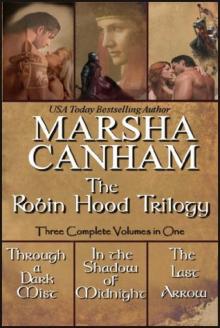 The Robin Hood Trilogy
The Robin Hood Trilogy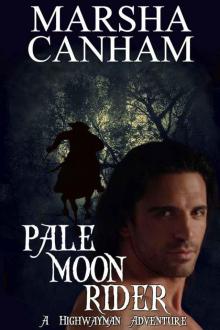 Pale Moon Rider
Pale Moon Rider Straight For The Heart
Straight For The Heart Across a Moonlit Sea
Across a Moonlit Sea Wind and the Sea
Wind and the Sea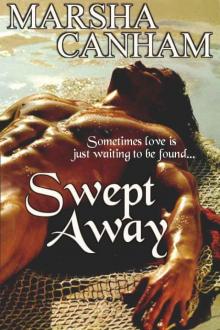 Swept Away
Swept Away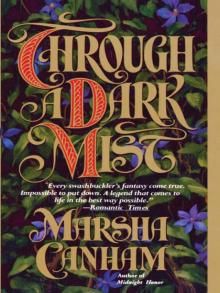 Through a Dark Mist
Through a Dark Mist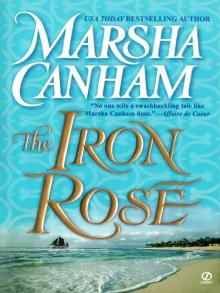 The Iron Rose
The Iron Rose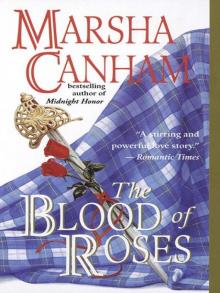 The Blood of Roses
The Blood of Roses The Far Horizon
The Far Horizon The Pride of Lions
The Pride of Lions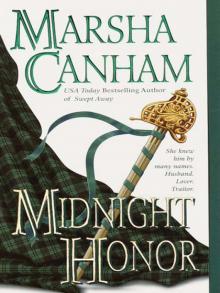 Midnight Honor
Midnight Honor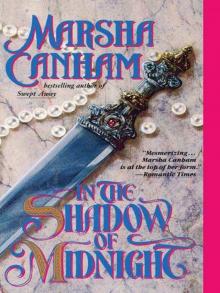 In the Shadow of Midnight
In the Shadow of Midnight China Rose
China Rose